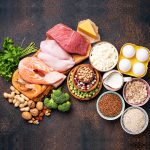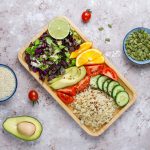We know how difficult and tiresome a weight loss journey can sound, but it need…
Read MoreWe all have some memory tucked away that is of our parents convincing us of the goodness of vegetables. Our upturned faces and adamant refusal to eat them. While we all know veggies are good for us, we’ve all had our journey of acceptance. Have you ever wondered if they help lose weight?
Before we answer that, let’s understand why being overweight or obese is a problem. Science recognizes the many complications linked to obesity – high blood cholesterol, high blood pressure, atherosclerosis, sleep disorders, heart disease, diabetes, and certain cancers, making it increasingly clear how important maintaining a healthy weight is.[1][Overweight and Obesity].National Institutes of Health.
And yes, upping your vegetable intake can support weight loss. Studies have found that increasing vegetable consumption can reduce the risk of weight gain as well as lead to weight loss. Vegetable consumption is also linked to smaller waistlines. Vegetables are typically low in calories and high in fiber and this might account for these beneficial effects. However, there’s a small caveat here. Starchy vegetables (potatoes) are linked to weight gain.[2]Nour, Monica, Sarah Alice Lutze, Amanda Grech, and Margaret Allman-Farinelli. “The relationship between vegetable intake and weight outcomes: a systematic review of cohort studies.” … Continue reading[3] Dreher, Mark L., and Nikki A. Ford. “A comprehensive critical assessment of increased fruit and vegetable intake on weight loss in Women.” Nutrients 12, no. 7 (2020): 1919. But green leafy veggies like spinach, kale, or lettuce make for great low calorie, nutrient rich additions to your diet. As do delicious zucchinis!
Experts suggest that most adult men should have at least 3 cups of vegetables in a day while most women need at least 2.5 cups. If you’re cutting back on calories to lose weight you can also reduce your vegetable intake proportionately. For instance, older adults (51 and above) who are advised to cut calories to prevent weight gain due to slower metabolism are advised to get around 2 cups of veggies for women and 2.5 cups for men.
Do keep in mind that while one measuring cup is equal to a serving of most vegetables, for raw leafy greens (such as lettuce or spinach) one serving is equal to 2 cups. As for vegetable juice, 8 ounces counts as a 1 cup serving.[4][How Many Vegetables Should You Eat Every Day?]. Verywell Fit.
The simple principle governing weight loss is that you need to burn more calories than you take in. A balanced, healthy, reduced-calorie diet helps to take care of one part of this equation while increased physical activity (or exercise) will increase your energy expenditure. And while increasing your non- starchy vegetable intake is certainly beneficial for weight management, some vegetables can be particularly helpful in this regard. Let’s take a look at some vegetables that can help you lose weight:
One study found that when rats were fed a high carbohydrate high fat diet it increased body weight, abdominal fat, and waist circumference. But supplementation with purple carrot juice reduced percentage gain in body weight as well as abdominal fat and waist circumference. And that’s not all. The unhealthy diet had also led to issues like impaired glucose tolerance, hypertension, liver dysfunction, oxidative stress, and heart problems in the participating rats. But purple carrot juice was able to reverse or lessen these effects. Anthocyanins, carotenoids, and phenolic acids present in purple carrots are thought to account for these beneficial effects.[5]Poudyal, Hemant, Sunil Panchal, and Lindsay Brown. “Comparison of purple carrot juice and β-carotene in a high-carbohydrate, high-fat diet-fed rat model of the metabolic syndrome.” … Continue reading
Raw red onions make for a delicious pungent addition to salads and burgers. And of course, they make a great base (along with tomatoes) for all kinds of curries. But the common red onion doesn’t just provide a boost of flavor, they can help manage your weight too. One study found that supplementation with red onion extracts reduced the body weight gain brought on by a high fat diet in rats. It was also able to increase energy expenditure and reduce body fat percentage and fat accumulation when compared to rats that weren’t given red onion extracts. These benefits are thought to be mainly due to the presence of a flavonoid known as quercetin in red onions.[6]Henagan, T. M., W. T. Cefalu, D. M. Ribnicky, R. C. Noland, K. Dunville, W. W. Campbell, L. K. Stewart et al. “In vivo effects of dietary quercetin and quercetin-rich red onion extract on … Continue reading
Research shows that tomatoes can help with weight loss. During the course of a study, participants consume one tomato before lunch for 4 weeks. This resulted in a significant reduction in body weight, fat percentage, fasting blood glucose, triglycerides, and cholesterol. The researchers suggest that having the tomato before lunch could have promoted satiety and therefore, led to them consuming fewer calories. The biochemical effect of phenolic and flavonoid compounds present in tomatoes could also have contributed to this effect.[7]Vinha, Ana F., Sérgio VP Barreira, Anabela SG Costa, Rita C. Alves, and M. Beatriz PP Oliveira. “Pre-meal tomato (Lycopersicon esculentum) intake can have anti-obesity effects in young … Continue reading
Broccoli certainly lives up to its reputation as a healthy vegetable. It’s good for your heart and reduces your risk for certain cancers. Animal studies have found that it can also reduce body weight gain and abdominal fat.[8]Aranaz, Paula, David Navarro-Herrera, Ana Romo-Hualde, María Zabala, Miguel López-Yoldi, Carolina González-Ferrero, Ana Gloria Gil et al. “Broccoli extract improves high fat diet-induced … Continue reading Steam, roast, or saute broccoli to make a healthy side dish. You can even have them raw with a yogurt dip or add them to soups for a boost of important nutrients like vitamin C, vitamin K, folate, potassium etc.[9][Broccoli Nutrition Facts and Health Benefits].Verywell Fit.
During one study overweight rats were given bitter gourd extracts for five weeks. It was found to significantly reduce not just body weight but blood glucose, and triglyceride levels too. Bitter gourds also reduced LDL-cholesterol (bad cholesterol) while increasing HDL-cholesterol (good cholesterol) levels. That’s a bitter veggie with some sweet health benefits.[10]Bano, Farhat, Naheed Akthar, and Hajra Naz. “Effect of the aqueous extract of Momordica charantia on body weight of rats.” Journal of Basic & Applied Sciences 7, no. 1 (2011). These veggies are rich in beneficial fiber and also a great source of nutrients such as vitamin C, vitamin A, potassium, calcium, phosphorus, copper, zinc, iron, etc.
Precaution:
Experts suggest that bitter gourds might not be suitable for pregnant women.[11][Bitter Melon Nutrition Facts and Health Benefits]. Verywell Fit.
Research shows that red cabbage can inhibit enzymes involved in the digestion of carbohydrates and fats. This suggests that they may be useful for weight management. [12]Podsędek, Anna, Iwona Majewska, and Alicja Z. Kucharska. “Inhibitory potential of red cabbage against digestive enzymes linked to obesity and type 2 diabetes.” Journal of agricultural … Continue readingRed cabbage also contains quercetin, a flavonoid which has been found beneficial for weight management. White cabbages contain quercetin too though in much lower quantities.[13]Liang, Ying, Yi Li, Liujuan Zhang, and Xianjin Liu. “Phytochemicals and antioxidant activity in four varieties of head cabbages commonly consumed in China.” Food Production, Processing … Continue readingYou can shred cabbages into a coleslaw or salad and they make a great addition to stews and soups. Or add them to a stir fry for a delicious boost of flavor and nutrition.
One study looked at the effect of purple lettuce for a period of 8 weeks on mice with diet induced obesity. It was found that this veggie prevented body weight gain by increasing energy expenditure and reducing fat mass accumulation. The consumption of purple lettuce also improved insulin sensitivity. The researchers suggest that these beneficial effects can at least partly be accounted for by the presence of bioactive molecules such as esculin and chlorogenic acid.[14]Han, Yingyan, Changhui Zhao, Xiaoyun He, Yao Sheng, Tianshi Ma, Zhifan Sun, Xueying Liu et al. “Purple lettuce (Lactuca sativa L.) attenuates metabolic disorders in diet induced obesity.” … Continue reading So, try adding some purple lettuce to your salads to boost your weight loss efforts.
Artichokes are another vegetable that may be beneficial in weight management. Artichokes inhibit digestive enzymes and experts suggest that this can have a beneficial effect on satiety signals. Moreover, they increase bile secretion and this can enhance the metabolism (breakdown) of carbohydrates and fats.[15]Mahboubi, Mohaddese. “Cynara scolymus (artichoke) and its efficacy in management of obesity.” Bulletin of Faculty of Pharmacy, Cairo University 56, no. 2 (2018): 115-120. These fiber rich vegetables are good for your heart and liver too. Artichoke hearts make a great addition to salads, soups, and sandwiches. You can also have them on their own as a side dish or snack.[16][Artichoke Nutrition Facts and Health Benefits]. Verywell Fit.
Sweet pepper or bell pepper contains a compound known as which plays a role in the oxidation of fat (ie, it helps “burn” fat) and also increases energy expenditure. It can, therefore, be a good veggie to have on your plate as it may support your weight loss efforts. [17] Padmaswari, Made Harumi. “Role of capsiate in obesity management.” Journal of Asian Medical Student Association 3, no. S2 (2014). Meanwhile, capsaicin, a compound present in spicy chilli peppers also increases energy expenditure and can help reduce body weight.[18]Zheng, Jia, Sheng Zheng, Qianyun Feng, Qian Zhang, and Xinhua Xiao. “Dietary capsaicin and its anti-obesity potency: from mechanism to clinical implications.” Bioscience Reports 37, no. 3 … Continue readingSo, both bell peppers and chilli peppers make a great addition to your diet. But obviously we can only consume chilli peppers in small quantities as they’re really spicy.
References
| ↑1 | [Overweight and Obesity].National Institutes of Health. |
|---|---|
| ↑2 | Nour, Monica, Sarah Alice Lutze, Amanda Grech, and Margaret Allman-Farinelli. “The relationship between vegetable intake and weight outcomes: a systematic review of cohort studies.” Nutrients 10, no. 11 (2018): 1626. |
| ↑3 | Dreher, Mark L., and Nikki A. Ford. “A comprehensive critical assessment of increased fruit and vegetable intake on weight loss in Women.” Nutrients 12, no. 7 (2020): 1919. |
| ↑4 | [How Many Vegetables Should You Eat Every Day?]. Verywell Fit. |
| ↑5 | Poudyal, Hemant, Sunil Panchal, and Lindsay Brown. “Comparison of purple carrot juice and β-carotene in a high-carbohydrate, high-fat diet-fed rat model of the metabolic syndrome.” British journal of nutrition 104, no. 9 (2010): 1322-1332. |
| ↑6 | Henagan, T. M., W. T. Cefalu, D. M. Ribnicky, R. C. Noland, K. Dunville, W. W. Campbell, L. K. Stewart et al. “In vivo effects of dietary quercetin and quercetin-rich red onion extract on skeletal muscle mitochondria, metabolism, and insulin sensitivity.” Genes & nutrition 10, no. 1 (2015): 2. |
| ↑7 | Vinha, Ana F., Sérgio VP Barreira, Anabela SG Costa, Rita C. Alves, and M. Beatriz PP Oliveira. “Pre-meal tomato (Lycopersicon esculentum) intake can have anti-obesity effects in young women?.” International journal of food sciences and nutrition 65, no. 8 (2014): 1019-1026. |
| ↑8 | Aranaz, Paula, David Navarro-Herrera, Ana Romo-Hualde, María Zabala, Miguel López-Yoldi, Carolina González-Ferrero, Ana Gloria Gil et al. “Broccoli extract improves high fat diet-induced obesity, hepatic steatosis and glucose intolerance in Wistar rats.” Journal of Functional Foods 59 (2019): 319-328. |
| ↑9 | [Broccoli Nutrition Facts and Health Benefits].Verywell Fit. |
| ↑10 | Bano, Farhat, Naheed Akthar, and Hajra Naz. “Effect of the aqueous extract of Momordica charantia on body weight of rats.” Journal of Basic & Applied Sciences 7, no. 1 (2011). |
| ↑11 | [Bitter Melon Nutrition Facts and Health Benefits]. Verywell Fit. |
| ↑12 | Podsędek, Anna, Iwona Majewska, and Alicja Z. Kucharska. “Inhibitory potential of red cabbage against digestive enzymes linked to obesity and type 2 diabetes.” Journal of agricultural and food chemistry 65, no. 33 (2017): 7192-7199. |
| ↑13 | Liang, Ying, Yi Li, Liujuan Zhang, and Xianjin Liu. “Phytochemicals and antioxidant activity in four varieties of head cabbages commonly consumed in China.” Food Production, Processing and Nutrition 1, no. 1 (2019): 1-9. |
| ↑14 | Han, Yingyan, Changhui Zhao, Xiaoyun He, Yao Sheng, Tianshi Ma, Zhifan Sun, Xueying Liu et al. “Purple lettuce (Lactuca sativa L.) attenuates metabolic disorders in diet induced obesity.” Journal of Functional Foods 45 (2018): 462-470. |
| ↑15 | Mahboubi, Mohaddese. “Cynara scolymus (artichoke) and its efficacy in management of obesity.” Bulletin of Faculty of Pharmacy, Cairo University 56, no. 2 (2018): 115-120. |
| ↑16 | [Artichoke Nutrition Facts and Health Benefits]. Verywell Fit. |
| ↑17 | Padmaswari, Made Harumi. “Role of capsiate in obesity management.” Journal of Asian Medical Student Association 3, no. S2 (2014). |
| ↑18 | Zheng, Jia, Sheng Zheng, Qianyun Feng, Qian Zhang, and Xinhua Xiao. “Dietary capsaicin and its anti-obesity potency: from mechanism to clinical implications.” Bioscience Reports 37, no. 3 (2017): BSR20170286. |
| ↑19 | [FODMAP Diet: What You Need to Know]. The John Hopkins University. |
| ↑20 | [Beat the bloat].NHS. |


Dr. Aswathy has 10+ years of experience as an Ayurvedic consultant and medical officer in different nursing homes and hospitals. She has a deep knowledge of classical texts, Ayurvedic treatments, and Panchkarma. Dr. Aswathy is proficient in diagnosis through traditional Ayurvedic means and plans treatment that is specific to an individual’s constitution.

We know how difficult and tiresome a weight loss journey can sound, but it need…
Read More
The key to healthy weight loss is achieving a negative energy balance or taking in…
Read More
Thanks for choosing Kapiva! Ayurveda is about balance, the same translates to its view on…
Read More
Welcome! We are truly thrilled to have you on board with us on Kapiva's personalised…
Read More